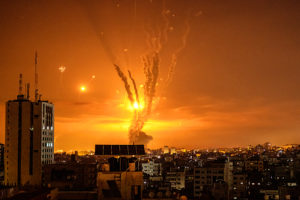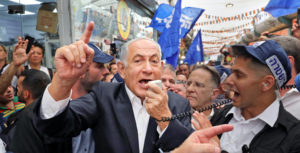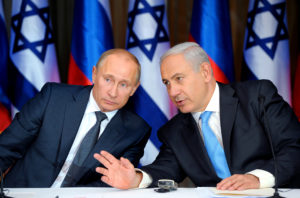Boris failed to make his comeback. Trump seems to want to, but probably won’t. Bolsonaro lost, thank God. But where others have failed, Benjamin Netanyahu has done it again. Despite all the scandals, the third coming of Bibi looks guaranteed. But this time it will be different, and not in a good way. In order to form the necessary coalition needed for government, Bibi will have to cosy up to the new Right-wing religious parties — although to describe them as Right-wing and religious is an insult to both terms.
“Kahanism Won” was the shocking headline of yesterday’s editorial in the liberal Haaretz newspaper. If that is the case, Israel is in more trouble than I ever thought possible. Born in the US, Meir Kahane was a radical orthodox rabbi and founder of the Israeli Kach party. He was convicted in America for manufacturing explosives. In Israel, he was convicted for the attempt to blow up the Libyan Embassy in Brussels, and arrested dozens of times for inciting violence against Palestinians. He saw himself as a modern-day Maccabee, railing against the assimilation of Israeli Jews into Western secular culture. His followers re-formed the first-century assassin group, the Sicarii, and targeted Left-wing Israeli politicians.
Kahane was elected to the Knesset in 1984. When he would get up to speak, other Jewish members would walk out en masse. In the 1988 elections, Kahane was barred from standing on the grounds of his “incitement to racism”. Two years later, Kahane was himself assassinated in New York, but his poisonous legacy lived on. Yigal Amir, the man who assassinated Prime Minister Yitzhak Rabin 27 years ago, as he was making peace with Palestinians, is considered one of Kahane’s disciples.
So for Haaretz to claim “Kahanism won” is a warning from history: something far more dangerous than Bibi has emerged from these elections. Kahane’s party is no longer. But its grandchild, Otzma Yehudit (Jewish Strength) has clearly done well, as have Right-wing religious parties such as Shas — both of which Bibi will have to rely on if he is to become Prime Minister. All this at a time when Israeli society is more divided than ever before. And not just between Jews and Arabs, but between Israeli Jews themselves. Tel Aviv is a modern European city, with a strong Barcelona vibe. This is the land of the Toyota Prius. Most of the restaurants are not Kosher. You can buy bacon in the market. The nightlife and fashion are sexy and relaxed.
But in most places outside Tel Aviv, the feel is very different. In the religious areas, in the poor parts of the country (especially in the South), in the settlements — this is where the Right and the far-Right have their base. From the perspective of Tel Aviv, the ultra-orthodox feel like an 18th-century throwback. “Penguinim” is the commonly-whispered secular pejorative for their black clothing. The ultra-orthodox do not fight in the army and often have no regular paid employment. They are exempted in order to study Torah. And they have many children, which, of course, is shifting the electoral demographic. So there is resentment from those whose children are sent to Gaza to fight (and die) and who pay taxes to support a religious lifestyle they do not understand.
I spoke to friends and family in Tel Aviv yesterday morning. They are in despair: the place they once knew and loved — the place their grandparents built — is disappearing before their eyes. “What sort of a country are we leaving to our children?” one said to me, holding back the tears. Many want to leave, as my wife indeed has left, but don’t know where to go.
Yet from the perspective of the ultra-orthodox, the Jews of Tel Aviv are not really Jews. Or rather, they are Jews officially (because they have Jewish mothers), but they do not behave as Jews should. Mostly, the ultra-orthodox do not have much of a view about the secular parts of Tel Aviv because they have not been there, despite the fact that a Heredi community like Bnei Brak (the fifth-most densely populated city in the world) is just a couple of kilometres away.
One Israeli friend recently told me that he met a young boy in a park in Bnei Brak who had never heard of the Holocaust. I found this almost impossible to believe. But what is absolutely true is how little different parts of Israeli society talk to, still less understand, each other. They don’t even speak the same language — both literally and figuratively. When my wife and I watched Shtisel together on the telly, I was astonished to find that I, having a smattering of German, understood more of the Yiddish than she did.
But it’s not just the secular and the religious that don’t mix. This is a country that has also been butchered by Bibi’s extreme version of free-market capitalism. Caesarea, on the coast, where Bibi has a house, has the only golf club in Israel and extraordinary gated mansions set in large, well-policed and leafy streets. The vineyards of the Galilee find many takers — myself included, I confess — for wines the price of which would make the farmers of Burgundy blush with embarrassment.
Elsewhere, the poverty is crippling. In the South, where the rich won’t live because it is too close to the rockets from Gaza, there is little work and conditions are often crowded and unsanitary. Around the old bus station in Tel Aviv, immigrants from Africa live in dirt and squalor, with elderly ladies selling their bodies out of street-side booths for a few shekels. They don’t pass by these places when they take Christians on a tour of the Holy Land.
You don’t need to mention the occupation to describe Israel as a divided society. The Shas party has a point when they defend the Sephardic (Arabic Jewish) community against the inherent sense of cultural superiority of the Ashkenazi former Europeans. Religious and secular, rich and poor, with Jews from all over the world: this is one of the most diverse, if not to say divided, societies on Earth. That is what makes it such an exciting place to be, but also one of the most fragile.
Itamar Ben-Gvir, the Kahanist leader of Jewish Strength, openly advocates violence against Palestinians. And he is only 46, with growing popularity and potentially a long future in politics. I am not a citizen of Israel, though my wife and children are. I look at the country with the gaze of an outsider, albeit an adopted one. But I love the place. And yet today, I fear for its future more than ever.
Disclaimer
Some of the posts we share are controversial and we do not necessarily agree with them in the whole extend. Sometimes we agree with the content or part of it but we do not agree with the narration or language. Nevertheless we find them somehow interesting, valuable and/or informative or we share them, because we strongly believe in freedom of speech, free press and journalism. We strongly encourage you to have a critical approach to all the content, do your own research and analysis to build your own opinion.
We would be glad to have your feedback.
Source: UnHerd Read the original article here: https://unherd.com/





